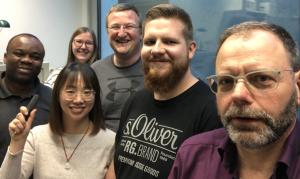About Travelling Fellowships
Three of The Company of Biologists’ journals – Development, Journal of Cell Science and Journal of Experimental Biology – offer Travelling Fellowships of up to £3,000 to graduate students and post-doctoral researchers wishing to make collaborative visits to other laboratories. These are designed to offset the cost of travel/accommodation and other related expenses. There is no restriction on nationality.
Travelling Fellowships
Applicants should be working in the field of the journal to which they apply and plan to visit another laboratory. Each application will be judged on the excellence of the candidate, as well as the importance and innovative quality of the work to be done.
Please review the Frequently Asked Questions (FAQs) before completing and submitting your application.
Note: We are unable to pay awards to recipients in jurisdictions, countries or regions of the world subject to sanctions, embargoes or other political trade restrictions put in place by the United Nations, the EU or the UK.
Guidelines for completing the application form:
- Only one person per laboratory may apply for funding, per funding round, per journal
- Applications are strictly limited to one journal only, per round of funding, per person
- The date of travel must occur within six months of funding being awarded
- Applications will not be considered retrospectively
- We do not provide funds to attend training courses
- Applications will be considered from early career scientists, which includes graduate students and post-doctoral researchers
- The application form and all supporting documents must be completed in English
- Travelling Fellowships can only be awarded once every two years from any of our journals per applicant
- Expenses include travel, subsistence, accommodation, visa, bench and user fees. Travel insurance costs are not to be included in the expenses. Any funding granted will only apply to expenditure incurred within 3 months of the visit commencing
- Please attach the following documents to your application:
- Letter of status from your Head of Department. (Note: If your Head of Department is also your Supervisor, two letters should be written, one in each capacity.)
- Letter of support from your Supervisor
- Letter of support from your host laboratory (Note: All letters of support must be in English, on headed paper and signed.)
- Curriculum Vitae
- Publication list
- It is your responsibility to ensure that you meet the criteria required for a Travelling Fellowship.
Conditions of the Travelling Fellowship
-
- If your application is successful, you will be required to sign our Travelling Fellowship Agreement.
- You may only apply to one journal. Please ensure that the chosen journal is the most relevant to your field of study.
- If for any reason you do not carry out your collaborative visit or it is delayed beyond six months of the award, please email tf@biologists.com. Please also arrange for the Travelling Fellowship funds to be returned, in full.
- Any unspent funds must be returned within one month of the end of the visit.
- You must provide at least two bright, clear photographs and a 250-500 word summary of the results obtained from your visit within 3 months of return from the host lab.
- You must keep all of the receipts related to your visit and send to the Charity Administrator within one month of completion of your visit. These must be scanned and uploaded via the online application portal.
Deadline dates, applicant handbook & FAQs
2026
- 6 February 2026 (for travel after 23 March 2026*)
- 1 May 2026 (for travel after 15 June 2026*)
- 7 August 2026 (for travel after 21 September 2026*)
- 23 October 2026 (for travel after 7 December 2026*)
*Decisions announced on this date
Our applicant handbooks provide useful information on the process. Please click on Travelling Fellowship Grant applicant handbook to download.
Please submit your application in plenty of time.
If I am awarded a Travelling Fellowship, will I get the funding before I go on my visit?
The funding will be paid directly into your personal bank account 3 to 6 weeks after successful provision of a signed grant agreement and bank details.
I assume any amount of money that I can’t explain with receipts will have to be returned?
Yes, we do require evidence for every expense incurred and paid.
Do supporting letters have to be signed?
Yes, all supporting letters must be on headed paper with a signature. They can then be scanned and uploaded via the online application portal.
What information needs to be included in the Letter of Status from my Head of Department?
The Letter of Status must include who you are, describe the work you are doing and how long you have been at that institution.
Is it acceptable to complete the application with estimated costs for expenses as I don’t know the exact costs at this stage?
Yes, that is acceptable, as you will be required to provide evidence of expenditure and return unspent funds.
Can my Supervisor send you his/her letter directly?
No that will not be possible.
Can I apply for a Travelling Fellowship even if I have already begun the project before the deadline?
No, we do not award funds to collaborations that have already commenced before the decision date. We do not fund in retrospect.
Will I have an answer about the result of my application even if it is negative?
Yes, you will be notified even if your application is unsuccessful.
If my Supervisor and Head of Department are the same person, do I need to include two letters?
Yes, we will still require two letters, one in each capacity.
If my application is not successful, can I re-apply?
Unsuccessful applicants may may re-apply for a Travelling Fellowship for a revised project 12 months from the date of the original application, but may not submit a new application within two years of their initial application.









You must be logged in to post a comment.